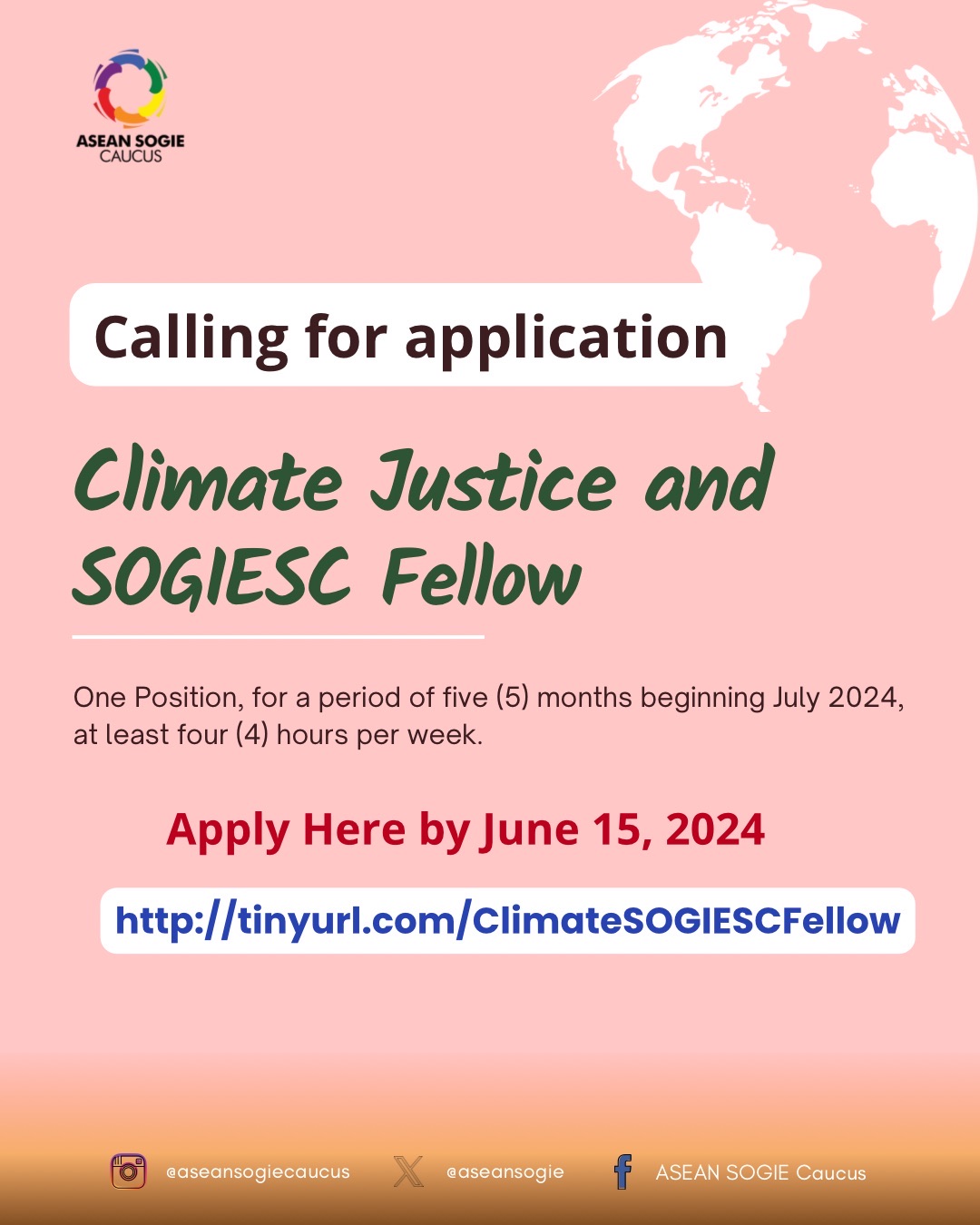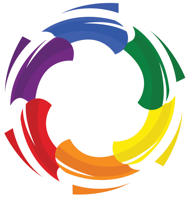Climate Justice and SOGIESC Fellow

1. Background
Multilateral organizations have already expressed serious concern over the growing importance of dealing with climate change. The UN Office of the High Commissioner for Human Rights (OHCHR) framed the “climate crisis” as the biggest threat to survival as a species and is already threatening human rights around the world”. Various human rights are impacted by climate change such as the right to life, the right to self-determination, right to development, right to health, right to food, rights to water and sanitation, right to adequate housing, as well as cultural rights. Climate change is reported to be a crucial threat to health as it intensifies a variety of food-, water-, or vector-borne diseases, not to mention heat-related stress; dislocates persons and communities from ancestral or cultural domains due to the onslaught of calamities such as typhoons and flooding with an impact on livelihoods that renders their resilience to bounce back weakened.
Marginalized groups are considered highly vulnerable in situations of climate crisis. Women are at risk of experiencing gender-based violence following a disaster, which includes domestic violence, the double burden to address both domestic concerns and economic survival, and trafficking, among others. Children, especially in areas affected by extreme weather conditions whether typhoons, droughts, or flooding, will significantly be vulnerable to “water stress” or situations where there is an inadequate supply of clean and safe water. UNICEF has projected that, by 2024, almost 600 million children will be living in areas of extremely high water stress. Indigenous people find themselves at the frontlines of the climate crisis despite having contributed the least and in fact, have actively contributed to protecting the environment. Moreover, people with disabilities, who represent an estimated 1 billion people worldwide, will face a compounded problem of poverty, discrimination, stigma, and lack of participation in society which puts them at a disadvantage during disasters. Some impacts on people with disabilities include access to food and nutrition, education and training, adequate housing, and access to decent work. Furthermore, in times of calamity, LGBTIQ individuals and communities face discrimination and violence in shelters, making them reluctant to seek refuge in such circumstances, as well as in the access to aid.
Southeast Asia stands out as a particularly vulnerable region among those most affected by climate change. With a population totaling 640 million, it faces various hazards, including severe weather events and the escalating threat of sea-level rise. Citing a CNBC report in April 2024 from the UN report, the World Meteorological Agency (WMO), State of the Climate in Asia 2023, which highlighted how the accelerating rate of key climate change indicators such as surface temperature, glacier melting, and sea level rise, will have a major impact on society, the economy and the ecosystem in the region. Asia is said to still be the region most affected by natural problems in the world due to weather and climate. This continent is experiencing warming faster than the global average with a trend of almost doubling since the 1961-1990. Countries such as Indonesia, Malaysia, Myanmar, Philippines, and Viet Nam will continue to experience hot weather up to 45 degrees such as in April 2024.
Recognizing the intersectionality of climate change impacts and the chronic deterioration of climate conditions, urgent actions must be taken to address these issues. Focusing on this challenge aligns with ASC’s strategic priority in mainstreaming SOGIESC within ASEAN civil society, recognizing the intrinsic connection between LGBTIQ rights and the challenges posed by climate change.
This fellowship program represents a significant milestone in advocating for SOGIESC equality within the context of the climate crisis. It signals ASC’s commitment to promoting greater understanding and support for the rights and well-being of people with diverse SOGIESC, while also taking a step toward ensuring their adequate representation, meaningful engagement, and participation in the broader discourse of gender equality and climate justice and the development of inclusive policies.
Moreover, this initiative follows through two prior steps undertaken by ASC. First was the Exploratory Report on SOGIESC and Climate Justice in Southeast Asia. This research undertaken in 2023 generated emerging themes through which SOGIESC-focused groups can engage in climate justice discourses: strengthen data collection on the adverse impact of the climate crisis on LGBTQIA+ persons, advocate for safe spaces during disasters, strengthen meaningful participation of LGBTQIA+ persons in climate policy discussions, and the need to build a broader coalition for climate justice. Second was the Regional Learning Session on Climate, SOGIESC, and Youth which was convened in 2024. This initiative brought together like-minded advocates to stocktake ongoing intersectional work, and to carve some directions for collaborative work. Such includes influencing internal policies and programs of LGBTQIA+ organizations to incorporate a climate perspective and create spaces for knowledge generation among LGBTQIA+ groups.
2. Program Objective
ASC will sustain the steps made towards advancing a SOGIESC-inclusive climate agenda. The fellowship program has the following objectives:
-
Create a space for leadership among LGBTQIA+ advocates in developing strategies, innovate approaches, and frame advocacy messages to advance a SOGIESC-inclusive climate justice agenda.
-
Provide resources, and mentoring to selected LGBTQIA+ advocates to deepen their knowledge and experience to work on the intersections of SOGIESC and climate justice.
3. Program Design
By mid-2024, ASC will engage at least one (1) individual who will serve as ASC’s Climate Justice and SOGIESC Fellow for a period of five (5) to six (6) months starting July 2024. This program will generate a mutual learning process between ASC, the Fellow, and the Fellow’s mother organization or institution. During the period the fellow will leverage his/her/their expertise, reinforced by technical support from ASC, to cultivate new knowledge and facilitate conversations to deepen the intersectional work on SOGIESC and climate justice.
What are Expected from the Climate Justice and SOGIESC Fellow?
Within a period of five (5) months beginning July 2024, the person will devote at least four (4) hours per week to develop and implement a series of interrelated activities to deepen work on SOGIESC and climate justice. The person will be working with and mentored by a designated officer from ASC.
Prior to the start of the program, the fellow must develop a working plan that has a regional or cross-country component. The scope of work of the fellow should be at least two (2) of the eleven (11) covered countries of ASC.
The fellow’s plan may revolve around the following tracks:
-
Research track – The fellow will address an ongoing concern that is the lack of data. The fellow should determine a research problem such as on impacts of the climate crisis on LGBTQIA+ communities, case studies of good practices of LGBTQIA+ influencing of climate-related governance, on alternative practices done by LGBTQIA+ groups that reinforce an inclusive climate agenda. The fellow will leverage online media to cascade the new knowledge to a diverse range of stakeholders, and this can be done by publishing their ideas on leading media platforms.
-
Capacity-building track – The fellow will focus on deepening the knowledge, understanding, and capacity of LGBTQIA+ groups including ASC on climate-related concerns. The fellow can develop learning materials, modules, and other tools for internal strengthening. The fellow can create spaces for interaction and learning among activists working on climate change and SOGIESC.
What is an ideal Climate Justice and SOGIESC Fellow?
In selecting a Fellow, the following criteria will be used:
-
Demonstrated a track record of experience in the broader area of climate justice, the right to a clean and healthy environment, and environmental governance.
-
Must be affiliated with a mother organization or institution such as an NGO working on climate, environment, or human rights; or an academic institution with programs that specialize on sustainable development, gender, or human rights.
-
A person who is self-directed, self-motivated, and committed to innovating new ideas and approaches.
-
Since the program aims to develop leadership within Southeast Asian LGBTQIA+ communities, the person must be from and be based within Southeast Asia, and self-identifies as a lesbian, gay, bisexual, transgender, intersex, queer, non-binary, or gender-diverse person.
Will there be resources to help the fellow undertake a regional initiative?
Yes. The Fellow will be provided with a grant of five thousand US Dollars (USD5,000). This amount will be used to carry out the proposed initiatives be it research, or capacity development in the field of climate justice and SOGIESC.
What will the fellow gain from the program?
Apart from receiving a grant to undertake the proposed regional initiative, the fellow will be able to establish a professional affiliation with ASC and form connections with a broad range of networks.
This endeavor will enable the fellow to gain exposure to a broader context beyond their immediate area of expertise and enrich their understanding of the diverse challenges and opportunities for action within Southeast Asia.
The fellow may also have the opportunity to amplify the need for further work on the intersection of climate justice and SOGIESC in regional fora and convenings.
Moreover, in choosing either the research or capacity-building track, the fellow will have the opportunity to make meaningful contributions toward addressing the impacts of the climate crisis on LGBTQI+ persons and formulating/promoting inclusive climate action agenda.
How will ASC select the Climate Justice and SOGIESC Fellow?
-
A call for applications will be published and shared by ASC via referrals from its networks.
-
The selection committee will be composed of a combination of ASC staff, and the Steering Committee.
-
Each fellowship application will entail a proposed program of work. This program of work coupled with the background and experience of the person will be appraised during the selection process. It is important to note that the Fellow must already have a sense of clarity on their program of work from the very start.
-
Once the fellow has been identified, the person will be paired with an ASC mentor (a designated person from the Steering Committee or BOT who has a passion for Climate Justice).
-
ASC will have an MOU with the Fellow’s mother organization in order to ensure better coordination and institutional support and guidance. The budget that will be given to the fellow may be coursed through the mother organization.
For More Information, please contact This email address is being protected from spambots. You need JavaScript enabled to view it..
Are you interested in applying? You may accomplish the online application form via https://forms.gle/fXKhaTvMRUhSX5tX8.
